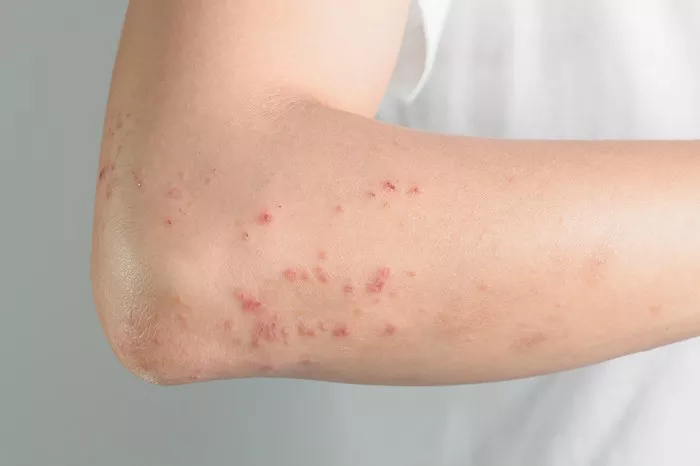Eczema, also known as atopic dermatitis, is a chronic skin condition that can cause redness, itching, and inflammation. When it appears on the back, it can be particularly challenging to manage because of the difficulty in reaching the area. Fortunately, there are several ways to treat and manage eczema on the back effectively. This article will guide you through the steps you can take to improve your skin’s health and relieve symptoms.
Understanding Eczema
Eczema is not just a single condition. It is a group of skin conditions that cause inflammation and irritation. The exact cause of eczema is not fully understood, but it often stems from a combination of genetic and environmental factors. People with eczema tend to have a compromised skin barrier, making it easier for irritants and allergens to penetrate and cause flare-ups.
Eczema on the back can be triggered by:
- Allergens such as dust mites or pollen
- Irritants like harsh soaps or detergents
- Dry skin due to weather changes
- Stress or hormonal imbalances
- Wearing tight or scratchy clothing
Identifying the cause of your eczema is crucial for effective treatment.
Keeping the Skin Moisturized
One of the most important steps in treating eczema is keeping the skin well-hydrated. Dry skin exacerbates eczema, leading to more irritation and itching.
To keep your back moisturized:
- Use a gentle, fragrance-free moisturizer designed for sensitive skin.
- Apply the moisturizer immediately after showering or bathing to lock in moisture.
- Look for creams or ointments that contain ingredients like ceramides, glycerin, or shea butter.
Moisturizing at least twice a day can significantly improve the skin’s condition over time.
Using Medicated Creams
For more severe eczema, over-the-counter or prescription medicated creams may be necessary. These creams work to reduce inflammation and control itching.
Common options include:
- Hydrocortisone creams for mild eczema
- Prescription-strength corticosteroids for more severe cases
- Non-steroidal creams such as pimecrolimus or tacrolimus
Follow your doctor’s instructions carefully when using these creams to avoid side effects.
Taking Warm, Gentle Showers
The way you bathe can impact eczema significantly. Long, hot showers can strip your skin of natural oils, worsening dryness and irritation.
For eczema on the back:
- Take short, warm showers instead of hot ones.
- Use a mild, soap-free cleanser that does not contain fragrances or dyes.
- Pat your skin dry with a soft towel rather than rubbing it.
Adding oatmeal or bath oils to the water can soothe irritation and reduce inflammation.
Avoiding Triggers
Identifying and avoiding triggers is essential for preventing eczema flare-ups. Since triggers vary from person to person, it may take some trial and error to figure out what works for you.
Common triggers to avoid include:
- Harsh laundry detergents and fabric softeners
- Tight or rough clothing that can irritate the skin
- Foods that may cause allergic reactions, such as dairy or nuts
- Stress, which can exacerbate symptoms
Keeping a journal of your activities, diet, and skin changes can help you identify triggers over time.
Wearing Comfortable Clothing
The clothing you wear can either help or hurt your skin. To avoid irritation:
- Choose loose-fitting clothes made of natural fabrics like cotton or bamboo.
- Avoid wool or synthetic materials that can cause itching.
- Wash new clothes before wearing them to remove potential irritants.
Comfortable clothing not only reduces irritation but also helps your skin heal faster.
Managing Stress
Stress is a known trigger for eczema. When you’re stressed, your body releases hormones that can worsen inflammation and itching.
To manage stress:
- Practice relaxation techniques such as deep breathing, meditation, or yoga.
- Maintain a regular sleep schedule to give your body time to heal.
- Engage in activities you enjoy to keep your mind off your skin condition.
Addressing stress can help reduce the frequency and severity of eczema flare-ups.
Considering Oral Medications
If topical treatments and lifestyle changes aren’t enough, oral medications may be needed. These are usually prescribed for severe cases and include:
- Antihistamines to reduce itching and improve sleep
- Antibiotics if the eczema is infected
- Immune-modulating drugs like cyclosporine or methotrexate
Always consult your doctor before starting any oral medication.
Trying Natural Remedies
Some people find relief from eczema symptoms with natural remedies. While these may not work for everyone, they are worth exploring if conventional treatments fall short.
Popular natural remedies include:
- Coconut oil for its moisturizing and anti-inflammatory properties
- Aloe vera gel to soothe irritated skin
- Witch hazel to reduce itching and inflammation
Make sure to patch-test any natural remedy on a small area of skin before applying it to your back.
Seeking Professional Help
If your eczema does not improve with over-the-counter treatments and lifestyle changes, it’s time to see a dermatologist. A dermatologist can:
- Perform tests to identify allergens or irritants
- Prescribe stronger medications or therapies
- Recommend advanced treatments like phototherapy
Early intervention can prevent eczema from becoming more severe.
Staying Consistent
Consistency is key to managing eczema. Treatments take time to work, and flare-ups may still occur occasionally. By sticking to a daily skincare routine and avoiding triggers, you can keep your skin healthy and reduce symptoms.
Conclusion
Getting rid of eczema on the back requires a combination of proper skincare, trigger avoidance, and possibly medical treatment. Moisturizing regularly, using medicated creams, and making lifestyle adjustments can go a long way in controlling this condition. If your symptoms persist or worsen, don’t hesitate to consult a healthcare professional. With the right approach, you can manage eczema effectively and enjoy healthier skin.
Related topics:

























